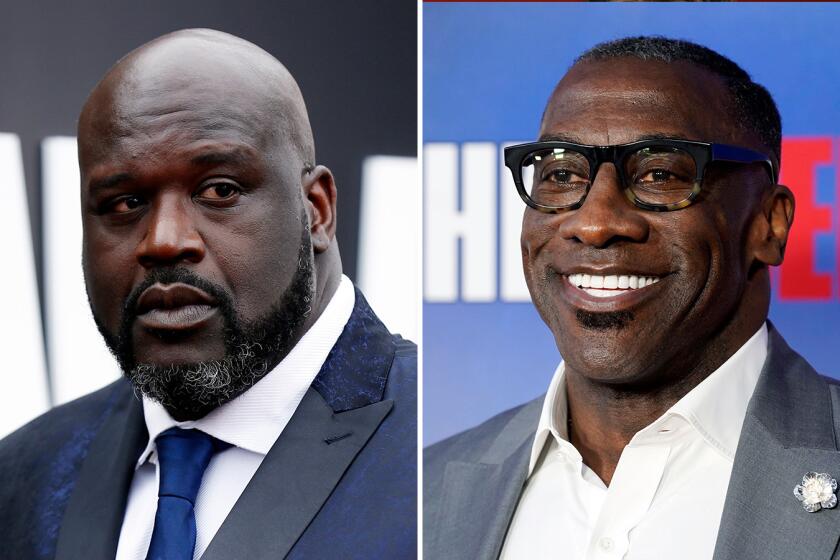IT CUTS BOTH WAYS
IT is Labor Day weekend and a bone-tired Jon Robin Baitz, one of the most successful playwrights of his generation, is taking sanctuary in an overly air-conditioned hotel room in the desert, curled up with his dog, Trip, and a book of S.J. Perleman stories. He is seeking respite from the trenches of production for the new ABC series “Brothers & Sisters,” which he created and which is set to premiere next Sunday.
Starring Calista Flockhart, Rachel Griffiths, Sally Field, Ron Rifkin and others, the ensemble drama about a conservative radio talk-show host and her L.A. family is one of this fall’s most anticipated new programs. Yet it hasn’t been a smooth road: They’ve had to recast key roles, reshoot the pilot and recently replaced the showrunner, the head writer and executive producer in charge of day-to-day creative production. Consequently, Baitz and his team have been playing catch-up in TV land, where the hours are grueling, even when you are on schedule.
For the record:
12:00 a.m. Sept. 17, 2006 For The Record
Los Angeles Times Sunday September 17, 2006 Home Edition Main News Part A Page 2 National Desk 0 inches; 20 words Type of Material: Correction
Playwright: An article today in the Calendar section about playwrights writing for television spelled author S.J. Perlman’s name as Perleman.
For The Record
Los Angeles Times Tuesday September 19, 2006 Home Edition Main News Part A Page 2 National Desk 0 inches; 26 words Type of Material: Correction
Writer’s name: A correction Sunday on the spelling of a writer’s name in a story that ran in Calendar misspelled writer S.J. Perelman’s surname as Perlman.
For The Record
Los Angeles Times Sunday September 24, 2006 Home Edition Sunday Calendar Part E Page 2 Calendar Desk 0 inches; 18 words Type of Material: Correction
Playwright: An article last Sunday about playwrights writing for television incorrectly spelled author S.J. Perelman’s surname as Perleman.
“I have co-written 4 1/2 or five episodes in the past three weeks,” he says. “It’s impossible: the pace, the times when you’re writing too much to write at your best. I cry a lot. I am horrifically exhausted. And as someone who had open heart surgery 10 years ago, I have been struggling to keep up with the system. But on the other hand, I created a TV show. I wanted to build something and share it with other artists -- just like the theater -- and that’s happening.”
Baitz is not the only playwright these days to hear the siren call of the small screen. Others who have recently worked on or are now working in TV include Aaron Sorkin, Peter Parnell, David Mamet, Theresa Rebeck, Marlene Meyer, Rolin Jones, Gina Gionfriddo, Jacqueline Reingold, Craig Wright, David Marshall Grant, the late John Belluso. And there are many others.
Moreover, playwrights are now producing, creating and running shows. Last season, Mamet created the “The Unit.” This season, it’s Baitz’s “Brothers & Sisters” and Sorkin’s latest, “Studio 60 on the Sunset Strip.” And Warren Leight, who, like Sorkin, has helped bring many fellow playwrights into the fold, has become the showrunner for “Law & Order: Criminal Intent.”
TV has become a desirable place for playwrights, and not only because of the money. The negative stigma that once used to cause playwrights to turn down their noses at the small screen has all but vanished.
“There’s no indignity in working in television!” says David Rambo. He sits in his office in the “CSI: Crime Scene Investigation” headquarters on the Universal lot, with posters from his plays adorning the walls and a miniature replica of the famous “Welcome to Fabulous Las Vegas, Nevada” sign -- a nod to where “CSI” is set -- blinking atop a bookcase.
In many cases, these playwrights don’t want to abandon the stage. They continue to write plays when they can -- less often, perhaps, but with no less dedication. And though it’s true that most playwrights will never have the creative control in TV that they have in the theater, the medium is increasingly seen as a place where they can create interesting work, albeit within the constraints of established form and practice.
“In a weird way, something flipped, in terms of where the quality writers are happiest at the moment, and I think it is TV,” says Leight, who started writing for television in the late ‘90s. “With movies, it’s too easy for them to bring in another writer and another writer after you.”
*
Sought-after scenarios
RAMBO is in the middle of an interview when his phone rings.
“Hello ... Sure, yeah. What the fibrosis looks like? If I recall, it was fibrosis of the palmer facia. Nodules on stringy tendons? Oooh-kay. Yeah, I’ll find something. You’re welcome. Bye-bye.”
The call is from the show’s second unit producer, who is working with a special-effects house and needs some visuals. “We have a medical condition that actually explains a huge story point in our season premiere,” he explains. “They want to show what it looks like close up, and he just wondered if I had research on that.”
“Yes, fibrosis of the palmer facia,” Rambo continues, suddenly hamming it up to underscore that playwrights don’t usually discuss such technical minutiae. “Nodules on stringy tendons. That’s what we do at ‘CSI’!”
Laughing, he then points to a sticky note with the number 1.5, stuck in a prominent place on his bulletin board. “How many playwrights do you know who keep in front of them at all times, on the wall, that liver temperature drops 1.5 degrees per hour, postmortem?”
The question may be rhetorical, but the point is made. TV -- and especially a highly popular crime procedural such as “CSI” -- can make very different demands on a writer than the theater. So how did a dedicated thespian such as Rambo wind up in a crime lab? Not by pounding Hollywood pavement.
William Petersen, “CSI’s” male lead and a veteran of Chicago theater, “wanted to get a playwright’s voice on the show,” says Rambo. “So our showrunner called the Geffen Playhouse to see if they knew of anybody who might be a good fit. The Geffen had a good experience producing my play ‘God’s Man in Texas.’ ”
That was in “CSI’s” fourth season; the show is now going into its seventh. “It’s my first writing experience in television,” says Rambo, whose play “The Ice-Breaker” will be staged by Art Manke at the Laguna Playhouse in February. “It’s a great education. It’s not easy, but it’s very satisfying.”
Diana Son didn’t spend years banging on doors or writing spec scripts either. Her play “Stop Kiss,” when it was produced at the Public Theater in New York in 1999, led directly to a writing job on “The West Wing,” a Sorkin show that was key in bringing playwrights into prime time, including Baitz, Parnell and others.
Unlike Rambo, however, Son hasn’t juggled her careers in complete simultaneity. “It took me eight years after ‘Stop Kiss’ to write ‘Satellites,’ ” she says of the drama that premiered at the Public in June. “And frankly, I was establishing myself as a TV and screen writer during that time.”
Neither Rambo, Son nor Baitz started their careers with television as a goal. As recently as the ‘80s, young MFA graduates of prestigious drama schools would rather have paid their bills by writing screenplays that would likely never get produced, or by teaching, scoffing at the notion of episodic TV.
But for newly minted playwrights today, it’s often a different story. Eric Overmyer, who has been writing for TV since “St. Elsewhere” in the early ‘80s and taught at the Yale School of Drama from 1991 to 2004, has seen the shift in attitude first hand.
“A number of my students have been working on TV,” says the playwright who recently worked on “The Wire” and is now writing for “Close to Home.” “I think that’s really changed. I think they’d like to be doing theater, TV and independent film all at once.”
The transition to TV, where a writer is writing for established characters and within established structural parameters, may even be easier than writing for film, where a writer must come up with the whole package. “They care if you can write dialogue and create complex characters,” Son says of TV’s requirements. “They worry less about if you can pull off plot.”
*
The financial incentive
THE idea of playwrights writing for TV really isn’t new. It goes back at least as far as Stephen Sondheim’s stint on the 1950s show “Topper.” But there’s been a marked uptick in recent years.
“Playwrights have always written for film and TV,” says Son. “Bertolt Brecht and others would function at movie studios as staff writers, when movie studios had staff writers. It was steady, salaried work. And these days, only TV writing is steady, salaried work.”
For a long time, the odds have been against making a living solely as a playwright. “There’s a touching naivete on the part of the theatergoers about the possibility of making a living as a playwright, as though you write for TV as the icing on the cake,” Son says. “People think it’s the difference between making, say, $60,000 and $80,000 a year, when really it’s the difference between making, say, $8,000 a year and $400,000 a year.”
Granted, there are exceptions. “There’s maybe one playwright every three or four years who can make a living,” says Leight, citing such recent works as David Auburn’s “Proof” and John Patrick Shanley’s “Doubt” as possible cases in point.
Playwrights are not salaried, do not receive benefits and do not have a strong union, as do screenwriters. And even if a playwright does land one of the few and far between most coveted opportunities for production and has a hit, their pay isn’t what you’d expect.
“If you get Manhattan Theatre Club or the Roundabout, they take 40% off all your future income, plus 10% for the agent, and sometimes the director gets a percentage too,” says Leight, referring to two prominent nonprofits operating on Broadway.
“One or two episodes of ‘Law & Order’ is about what I made off ‘Side Man,’ ” he continues, referring to his Tony Award-winning drama, which was widely produced, including at the Pasadena Playhouse.
So for the generation of writers now in their late 30s, 40s and 50s, there were pioneers who brought in other playwrights. “To me it’s like the dark ages for playwriting, and it’s a little bit like getting playwrights to safe ground,” says Leight. “I view this as a monastery during the Dark Ages.”
Rene Balcer, a former journalist, ran “Law & Order” for many years and then created its spinoff, “CI.” “He seemed to make a point of hiring playwrights,” Leight says.
Another patron saint is writer-producer Sorkin, whose play “A Few Good Men” was on Broadway before being made into a film. “I don’t think it’s any accident that there are so many playwrights in TV now,” says Rambo. “And we owe it all to Aaron Sorkin, because when ‘Sports Night’ got such notice for the quality of the writing, suddenly television sought playwrights. Then when ‘The West Wing’ came on, he brought other playwrights into the mix.”
*
Playing well with others
LIKE Alice in Wonderland, playwrights who enter TV find themselves in a world where the rules have changed. “It is so unlike the theater or film -- where there is a kind of Zen-like pace to how it all gets made,” Baitz says.
Another difference is that the director isn’t in charge. “One way that TV distinguishes itself from film is that the head writer is the boss, which is incomparable to the screenwriter, unless the screenwriter is also the director,” says Son. “The head writer/showrunner has their hand in casting, scheduling, salaries, everything. The head writer is also executive producer. It’s an extremely powerful position.”
In consort with a show’s creator, or particularly after a show’s creator has moved on, the showrunner is in charge of maintaining the program’s voice, holding everything together on the artistic side. But before they can even dream of becoming showrunners, TV writers must learn to work in collaboration with a team of writers.
“You have to accept -- and it was not easy for me to accept -- that there will be times when your name is on work that you didn’t write, and there will be times that you write things that your name is not on, that you do your thinking out loud with a group of people,” says Rambo, whose show has nine writers.
For Overmyer, the most difficult adjustment was dealing with endless notes from multiple sources. “The hardest thing to this day remains the amount of input from people higher up the food chain,” he says. “It’s just the sheer volume of input that can be tricky to negotiate.”
Baitz started out with a playwright-friendly first job. “The ‘West Wing’ experience was persuasive to me,” he says. “There were virtually no notes, and I was fooled into thinking that it’s always like that. I was soon relieved of that illusion, when creating ‘Brothers & Sisters.’ ”
In creating his show, he concurs with Overmyer regarding the difficulty of pleasing so many. “I had to find ways to filter my ideas through the extant system, which is executives at the studio first and then at the network,” says Baitz, who emphasizes his collaboration with showrunner Greg Berlanti and writer Craig Wright.
That collaboration, and the structure of working in TV versus the theater, will no doubt contribute to giving “Brothers & Sisters” a different voice than the plays for which Baitz is best known, including “The Substance of Fire,” “Three Hotels” and “The Paris Letter.”
“Is it going to be like my plays? So not,” Baitz says. “But I didn’t sign on here to do a show the way I would at Playwrights Horizons. When Steve McPherson, who is [ABC’s president of entertainment], e-mails me or calls, it’s just different from that call from Andre Bishop at Lincoln Center -- but that doesn’t mean they want me to not be myself. They want me to be an organized, accessible, precise version of myself, for a bigger audience, and I want to be that too.”
*
Cachet by association
THIS summer, Rambo did a workshop of his adaptation of the Sinclair Lewis novel “Babbitt” at A Noise Within, the Glendale-based classical theater company. There were only three public performances, the first of which was for students and teachers.
Rambo entered the theater quietly and sat down in the back row. Seated directly in front of him were two high school juniors. One of the young men, dressed in baggy shorts and flipflops, sat down next to the other. He then turned to his buddy, looked at him like he had the inside scoop, and said: “This’ll be cool. Dude from ‘CSI’ wrote it.”
The moral of the story may be that it isn’t all brain drain, as playwrights move to TV. The theater gains much-needed publicity when writers continue to work in TV, and TV enjoys the prestige of having successful playwrights in its ranks.
But what really keeps a playwright coming back to where he once belonged? It’s that intangible, ineffable allure.
“I’ve kind of got the bug again,” admits Overmyer, who’s working on a new play commissioned by D.C.’s Arena Stage. “It’s been six or seven years. I think I just needed some time away from the theater.”
For others, it goes as deep as identity. “Well, there you are, stuck with what you are: I am a playwright,” says Baitz. “There are these things that speak to me -- the little bit of dark before the lights come on ... the length of time you can sustain a scene. The undeniable autonomy and civility. The inextricable political pressure to write plays that live secret lives counter to the time we live in. The sheer impossibility of it keeps me coming back.”
More to Read
The biggest entertainment stories
Get our big stories about Hollywood, film, television, music, arts, culture and more right in your inbox as soon as they publish.
You may occasionally receive promotional content from the Los Angeles Times.






